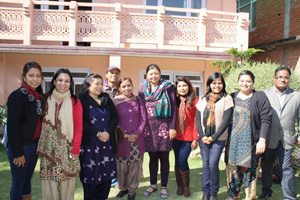Day 3: Nepal Exchange

In 1994, feminist, poet and journalist Robin Morgan who was serving as the global editor for Ms Magazine spent three weeks in Nepal consulting on women’s rights and Durga Sob, a Dalit woman who was thinking about oppression, gender, and caste had an opportunity to hear her speak and talk with her. That encounter stimulated the founding of FEDO.
On Monday, along with the staff of FEDO, I met founders Durga and Renu Sijapati. Durga and Renu (who was only in grade 8 at the time!) along with five other women formed FEDO to fight discrimination based on caste and gender. Discrimination based on caste was outlawed in Nepal in 1963, but the social norms and values are very deeply entrenched and the caste system remains strong. In the caste system here, people who are Dalit are considered ‘untouchable,’ and that experience, as expected, results in extreme poverty and exclusion—and high rates of disability. From its beginnings, the women of FEDO recognized that Dalit women with disabilities would be included in their work. Three of the District Leaders in their vast network (more about that in a minute) are women with disabilities.
Like DREDF, FEDO’s work is focused on ending discrimination by shaping legislation, promoting justice, and educating Dalit women and all stakeholders about the rights of Dalit women. During my time with them yesterday I came to understand the status of Dalit women and what FEDO combats:
- 90% of Dalit girls end their education at grade 5 to help in the home or to generate income
- The average marrying age of Dalit women (girls!) is 14 (the legal age to marry without parent consent is 20)
- 90% of Dalit women live far below the Nepal poverty line
- Dalit women experience high rates of domestic violence and abuse by strangers
A few examples of FEDO’s remarkable achievements include:
- First group to educate the government about discrimination against Dalit women, and continues to be the voice of Dalit women before the Constitutional Assembly
- During the elections of 2008, they campaigned for and were successful in getting 24 Dalit women elected to the Constitutional Assembly. Five of the women were FEDO members
- Built a 45,000 member network of Dalit women across Nepal
The Network is justifiably one of FEDO’s major assets. FEDO has chapters in 57 out of 75 Districts in Nepal, and those chapters support Women’s Groups of about 30 individuals, giving FEDO a total of about 45,000 members! Each Chapter has seven to nine active leaders at any time—this means that there are about 500 women to activate other women around Nepal to push for change—and activation is done by telephone because most of rural Nepal does not have access to the Internet. It’s an amazing accomplishment.
November 25 was the first day of a countrywide 16 day “Stop Violence Against Women“ campaign. FEDO is actively working with other Nepalese women’s organizations on the Campaign by telling individual stories of violence to the media, organizing marches and conducting trainings for Dalit women and their family members. In the city for the events, one of the disabled women district leaders was in Kathmandu for a training and I had the opportunity to meet her. It was perfect timing.
At the end of the day, Nirmala, Rakshya and Renu accompanied me to the National Human Rights Commission in the afternoon. The NHRC advised the government on human rights conditions, takes and investigates complaints of discrimination and makes recommendations for remedies. I met with the staff responsible for cases of disability discrimination—sadly, most complaints are about violence against people with disabilities. As a result of a recent Supreme Court decision finding that it is discriminatory to hold people with mental illness in hospitals indefinitely, the NHRC has been focusing on deinstitutionalization of people with psychiatric disabilities.
I asked whether people filed complaints about access. There is very little physical access in Nepal despite a government code requiring new construction to include accessibility. Unfortunately, because there is little awareness about the code and the status quo is so deeply embedded, the answer was “no.” The Commission has filed complaints with the government because a major roads development has failed to include access. The disability community had requested that new roads include a separate lane for people who use mobility aids, but it doesn’t appear the plans include their request.
Tomorrow, we’re off to Kavre District to meet with grassroots women’s groups.
